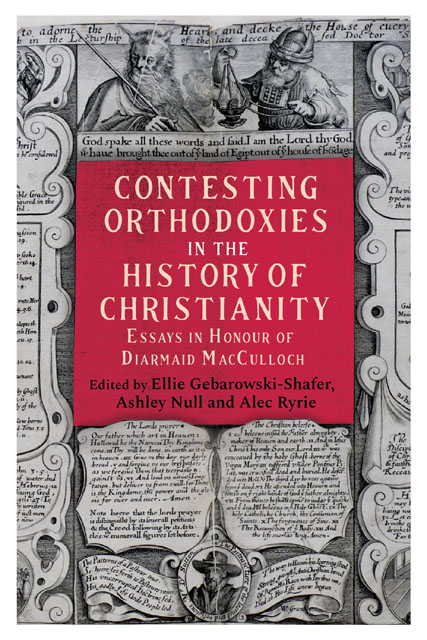Book contents
- Frontmatter
- Contents
- List of Illustrations
- List of Contributors
- List of Abbreviations
- Introduction
- 1 ‘Jewish Christianity’ in Antiquity: Meaningless Category or Heuristic Irritant?
- 2 ‘Sola Fide’: the Wrong Slogan?
- 3 Both Cromwellian and Augustinian: the Influence of Thomas Cromwell on Reform within the Early Modern English Austin Friars
- 4 Lex, Rex and Sex: The Bigamy of Philipp of Hesse and the Lutheran Recourse to Natural Law
- 5 The Authority of Scripture in Reformation Anglicanism: Then and Now
- 6 Orthodoxy and Heresy in the Post-Reformation
- 7 Profanity and Piety in the Church Porch: the Place of Transgression in Early Modern England
- 8 Writing on the Walls: Word and Image in the Post-Reformation English Church
- 9 The Myth of the Church of England
- 10 Mysticism, Orthodoxy and Reformed Identity before the English Revolution: the Case of John Everard
- 11 Sacrilege and the Sacred in England’s Second Reformation, 1640–1660
- 12 ‘I had not the patience to be quiet’: Arthur Bury and The Naked Gospel
- 13 ‘A soul-corrupting indifferentism’: the Intellectual Development of Benjamin Henry Latrobe
- 14 Newman, Dogma and Freedom in the Church
- 15 ‘Tommy, ’ow’s yer soul?’ Reconsidering Religion and the British Soldier
- 16 The King James Vulgate
- 17 The Myth of the Anglican Communion?
- Select bibliography of Diarmaid MacCulloch’s scholarly publications
- Bibliography
- Index
- Tabula Gratulatoria
- Studies in Modern British Religious History
1 - ‘Jewish Christianity’ in Antiquity: Meaningless Category or Heuristic Irritant?
Published online by Cambridge University Press: 09 January 2024
- Frontmatter
- Contents
- List of Illustrations
- List of Contributors
- List of Abbreviations
- Introduction
- 1 ‘Jewish Christianity’ in Antiquity: Meaningless Category or Heuristic Irritant?
- 2 ‘Sola Fide’: the Wrong Slogan?
- 3 Both Cromwellian and Augustinian: the Influence of Thomas Cromwell on Reform within the Early Modern English Austin Friars
- 4 Lex, Rex and Sex: The Bigamy of Philipp of Hesse and the Lutheran Recourse to Natural Law
- 5 The Authority of Scripture in Reformation Anglicanism: Then and Now
- 6 Orthodoxy and Heresy in the Post-Reformation
- 7 Profanity and Piety in the Church Porch: the Place of Transgression in Early Modern England
- 8 Writing on the Walls: Word and Image in the Post-Reformation English Church
- 9 The Myth of the Church of England
- 10 Mysticism, Orthodoxy and Reformed Identity before the English Revolution: the Case of John Everard
- 11 Sacrilege and the Sacred in England’s Second Reformation, 1640–1660
- 12 ‘I had not the patience to be quiet’: Arthur Bury and The Naked Gospel
- 13 ‘A soul-corrupting indifferentism’: the Intellectual Development of Benjamin Henry Latrobe
- 14 Newman, Dogma and Freedom in the Church
- 15 ‘Tommy, ’ow’s yer soul?’ Reconsidering Religion and the British Soldier
- 16 The King James Vulgate
- 17 The Myth of the Anglican Communion?
- Select bibliography of Diarmaid MacCulloch’s scholarly publications
- Bibliography
- Index
- Tabula Gratulatoria
- Studies in Modern British Religious History
Summary
Christianity’s struggles to define orthodoxy in its first centuries have cast a long shadow. This essay explores the historiographical and historical background of Jewish Christianity, a category made all the more fraught since Christianity and Judaism, despite their apparent ‘parting of the ways’, remained deeply entangled entities. Hence, the clarity between the two groups found in early chroniclers of Christianity would seem to be more aspirational than actual. Irenaeus adopted an essentialist narrative, that the pure gospel of Jesus was distorted by the ‘heresies’ of later groups, including Jewish believers who held on to practices of the law. Following a teleological approach, Eusebius described Christianity as ‘a consistent distancing from and critique of Judaism’. In the process the contention is made that, arguably, the first and most consequential Christian orthodoxy and heresy, namely ‘Judaism’ and ‘Christianity’, were, like all subsequent heresies and orthodoxies, not so much ‘begotten’ but made, shifting taxonomies, which do not sit easily with static definitions. The study of ‘Jewish Christianity’, which throws up complex issues of definition, gives acute voice to this observation, suggesting more generally that Christianity’s historians take a more nuanced and suspicious view of the idea of ‘difference’.
Introduction
In the discussion of the subject of heresy and orthodoxy in the ancient Christian church there has been a gradual movement away from what some term the Irenaean, others the Eusebian, model of orthodoxy and heresy, which posits an original truth with Jesus, handed on by the apostles and then distorted by ‘heretics’. Walter Bauer’s important study of 1934 marked a significant advance on what had preceded, in his claim that in numbers of places in the empire it could be shown that so-called heresy preceded so-called orthodoxy. Arguably more important, however, was the work of Alain Le Boulluec, for where Bauer had assumed an essence to the categories of orthodoxy and heresy (his thesis could only work with such an assumption), the Frenchman, influenced by Foucault, moved the conversation towards the representation of the two categories. In such a view heresy and orthodoxy were not essences, but concepts which had been created. In this view one could not talk about one preceding the other, as Bauer had done, but of their necessarily simultaneous creation in a particular historical context.
- Type
- Chapter
- Information
- Contesting Orthodoxies in the History of ChristianityEssays in Honour of Diarmaid MacCulloch, pp. 7 - 24Publisher: Boydell & BrewerPrint publication year: 2021



